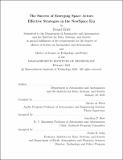| dc.contributor.advisor | de Weck, Olivier | |
| dc.contributor.author | Erkel, Daniel | |
| dc.date.accessioned | 2023-03-31T14:31:41Z | |
| dc.date.available | 2023-03-31T14:31:41Z | |
| dc.date.issued | 2023-02 | |
| dc.date.submitted | 2023-02-15T14:04:37.774Z | |
| dc.identifier.uri | https://hdl.handle.net/1721.1/150096 | |
| dc.description.abstract | In an era of ubiquitous space technology, policy makers around the globe face a choice: become a space power or become obsolete. Recent armed conflicts showed the strategic importance of satellite imagery and communication enabled by commercial satellites and consequently strengthened an already growing impetus for actors to enter or increase their engagement in the space domain. Research previously demonstrated the socio-economic benefits of space technology in emerging space nations. However, circumstances have changed since. While "traditional" avenues to join the industry still exist, the paradigm shift of the so-called NewSpace era introduced new opportunities. These opportunities come with new risks. Today's space technology is more affordable than ever before and project life cycles appear faster. However, rapid and high returns on investments are not guaranteed, neither are societal benefits through space. We are yet to see strong and more importantly widespread financial and socio-economic returns in the NewSpace ecosystem. Emerging actors must therefore systematically examine trends in the domain and develop resilient and flexible strategies. This is the gap this thesis aims to address. First, the thesis discusses the paradigm shift of the NewSpace industry along with the analysis of its key trends, drawing attention to some less-discussed risks present today. Following this, the thesis explores the classification of emerging space actors and presents a framework to chart their development. Finally, a systems engineering-focused approach to space strategy development is presented along with a novel approach in agile aerospace engineering, enabling cost-effective and risk-reduced microgravity experiments for emerging space actors as a possible stepping stone to join the space ecosystem. | |
| dc.publisher | Massachusetts Institute of Technology | |
| dc.rights | In Copyright - Educational Use Permitted | |
| dc.rights | Copyright MIT | |
| dc.rights.uri | http://rightsstatements.org/page/InC-EDU/1.0/ | |
| dc.title | The Success of Emerging Space Actors: Effective Strategies in the NewSpace Era | |
| dc.type | Thesis | |
| dc.description.degree | S.M. | |
| dc.description.degree | S.M. | |
| dc.contributor.department | Massachusetts Institute of Technology. Institute for Data, Systems, and Society | |
| dc.contributor.department | Massachusetts Institute of Technology. Department of Aeronautics and Astronautics | |
| dc.identifier.orcid | 0000-0002-3265-9331 | |
| mit.thesis.degree | Master | |
| thesis.degree.name | Master of Science in Technology and Policy | |
| thesis.degree.name | Master of Science in Aeronautics and Astronautics | |
